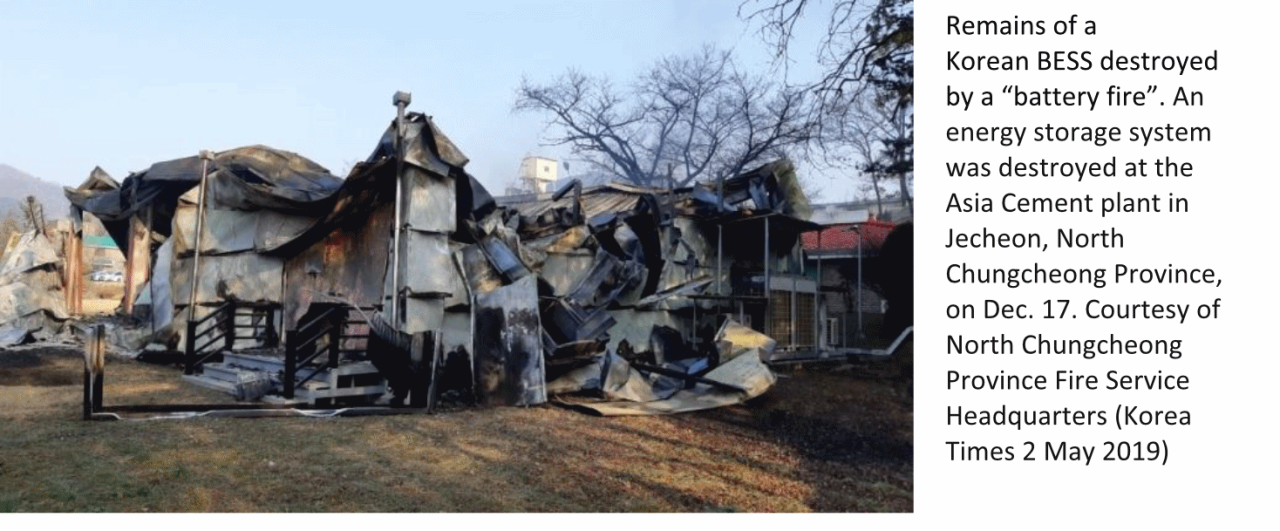
The unregulated risks of stored energy
Press release 9 June 2021
Grid-Scale Lithium-ion Batteries – the Next Grenfell?
The race for renewable energy driven by the 2050 Net Zero target requires energy storage and this is bringing large lithium-ion batteries into our day to day lives, close to our homes and work-places, on an unprecedented scale.
Concern that this new aspect of the energy sector is almost unregulated has brought together three expert physicists (Professor Wade Allison, Dr Fordham and Professor Sir David Melville) to call upon Government and regulators to begin an urgent review of the burgeoning proposals for mega-scale Lithium-ion battery developments that call safety and policy into question. Their working-paper is freely available online at researchgate.net:
The paper shows that Lithium-ion batteries are known around the world in the energy industry as susceptible to thermal runaway, where the energy stored is released in an uncontrolled fashion as heat, causing fires and the release of toxic gases.
This is no theoretical matter. Accidents are already occurring, and serious incidents in Arizona, Liverpool, and the latest Tesla car fire, indicate that these thermal runaways are notoriously difficult to suppress. It is quite unlike a normal fire and cannot be extinguished by starving it of oxygen.
Accidents of this kind are not isolated; the industry has reported 30 or more known incidents globally at mega-sites, and others are suspected to be unreported.
The results of these accidents can be catastrophic, resulting in the combustion of nearby structures, and, most alarmingly, the emissions of large quantities of highly toxic, life threatening gases, such as Hydrogen fluoride. This poses a unique threat to neighbours and firefighters.
Unfortunately, the engineering standards required to mitigate these dangers are insufficiently established, and the relevant Government departments have not issued appropriate regulation.
Government failure to properly understand the dangers of insulating cladding resulted in the Grenfell tragedy. Government needs to get a firm grasp of the hazards of Lithium-ion batteries before there is a another “green” disaster.
Professor Wade Allison, co-author of the paper, comments:
“Safety standards, such as those applied in Electric Vehicle batteries, are already challenging. For Battery Energy Storage Systems (BESS) with a very much larger quantity of stored energy there appear to be no standards that adequately address thermal runaway. These are needed for the design and siting of a battery to inhibit thermal propagation, and also for the emergency procedure in the event of a runaway incident. Furthermore, the Health and Safety Executive (HSE) is apparently ignoring or defying the Control of Major Accident Hazards Regulations (COMAH) 2015, intended to safeguard public health, property and the environment.”
In the UK there are an increasing number of developments in the pipeline involving lithium-ion battery storage including Cleve Hill, Kent already approved at 700MWh. Batteries many times larger are already in planning, of which the Sunnica proposal near Newmarket is the largest in the UK with just under 3,000 acres of panels, and an unknown level of battery storage, but thought to be as high as 1,500 MWh to 3,000 MWh, several times the energy released in the August 2020 Beirut explosion.
This capacity would require around 70 acres of batteries, many in proximity to houses and workplaces. We need the authorities to step up quickly, recognise the dangers and improve the engineering standards to ensure public safety.
Local resident and neighbour to the Sunnica proposal in Newmarket, Dr Catherine Judkins, said:
“There is a worrying void right now – a lack of awareness of the scale and difficulty of the Lithium-ion battery hazard meaning that first responders could be sent to fight a ‘fire’ without the necessary equipment or comprehension, putting the emergency services themselves at risk and compromising their ability to protect the public.”
Based on their recently published paper citing the scientific issues, the authors are calling for urgent review of these large-scale lithium-ion battery installations, along with support from local community groups wanting robust restrictions on siting away from residential property and communities.
Editors notes/contact
Co-Authors:
EurIng Dr Edmund Fordham MA PhD CPhys CEng FInstP (Fellow of the Institute of Physics)
Dr Wade Allison MA DPhil
Professor of Physics, Fellow of Keble College, University of Oxford
Professor Sir David Melville CBE FInstP
Professor of Physics, former Vice-Chancellor, University of Kent
Press contact for comment via:
Isabel Cross isabelcross@btinternet.com
Mob: 07867 970749
Don't know if you've seen this. It's a documentary on the Boeing 747-8F but it talks quite a bit about e-race car batteries: "Boeing 747-8F Cargo Jumbo Jet - Mighty Airplanes" Youtube Listen very closely to what they say about their cargo, i.e., Li-ion batteries & e-race cars. Also note that IATA have very strict rules on the air transport of Li-ion batteries.
Comparing the energy of a battery system to the energy of the Beirut blast? Is the author trying to confuse and frighten the unwary? The biggest battery fire explosions have been due to flamable gases accumulating in an outer enclosure and later suddenly igniting. But only a very small fraction of a battery bank's energy could accumulate in that fashion.
Vehicle Fuel Efficiency and Pollution Control Consultant
2yNot to mention the attractiveness of these facilities for terrorist action. Think of the expense of protecting thousands of these facilities, 24-7, against homemade rockets. Good grief!
Founder, Rudolph Kalveks Associates
2yPlease remind me - how is wholesale adoption of lithium battery technology supposed to be good for the environment?
Master, Worshipful Company of Scientific Instrument Makers
2yVery interesting and concerning.